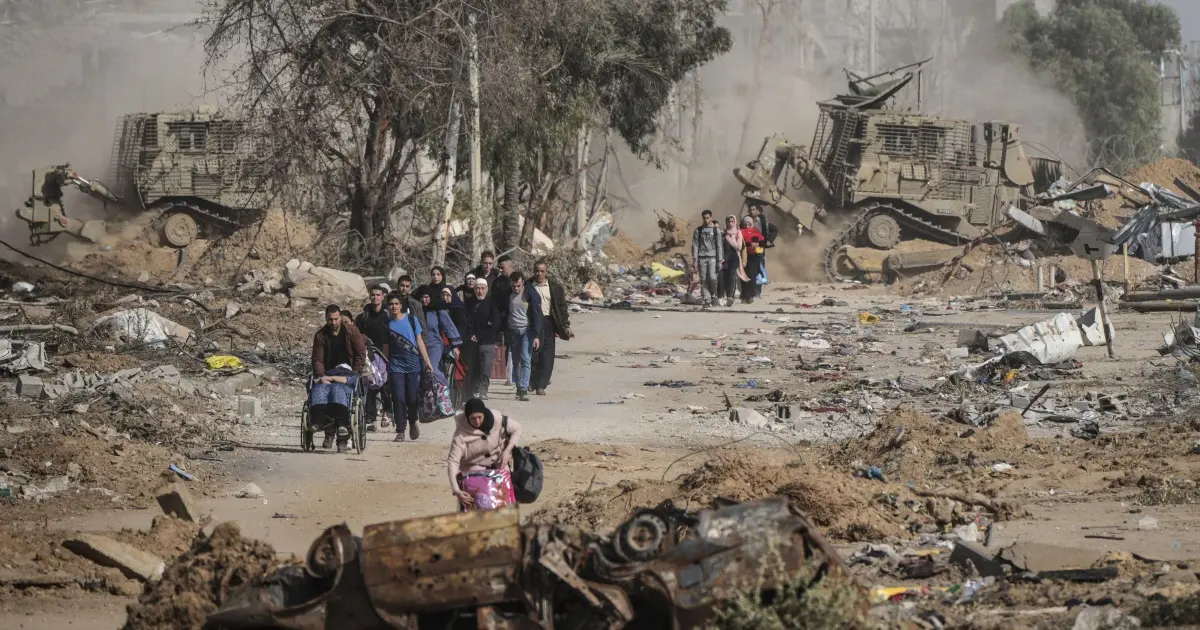Today, the Gaza Strip is a glaring example of human tragedy, where unrelenting violence, siege, and poverty have driven a whole population to the brink of extinction. Leading voices and international organizations are raising the alarm about the unprecedented extent of suffering and the serious ramifications for international law and morality as the crisis worsens in front of the world.
An Advent of a Humanitarian Tragedy
Since October 2023, more than 52,500 Palestinians have been killed by Israeli military operations in Gaza, with women and children accounting for about 70% of the deaths. Over 118,000 people have been reported injured by the UN and other humanitarian organizations, and 2.1 million people — almost the whole population of Gaza — are trapped in what has been called the ‘direst humanitarian crisis’ due to the destruction of homes, hospitals, and vital infrastructure. Some of the most severe warnings to date have come from UN experts, who say:
“While States debate terminology — is it or is it not genocide? — Israel continues its relentless destruction of life in Gaza, through attacks by land, air and sea, displacing and massacring the surviving population with impunity… This is one of the most ostentatious and merciless manifestations of the desecration of human life and dignity.”
Starvation as a Weapon of War
Bombs and bullets are not the only cause of Gaza’s humanitarian crisis. Israel has imposed a near-complete blockade since March 2025, denying access to fuel, food, water, and medical supplies. The UN claims that this has resulted in widespread disease, dehydration, and starvation, and that famine is now a real threat to half a million people.
Nearly 71,000 children are estimated to be experiencing acute malnutrition, with over 14,000 cases being severe, according to the Integrated Food Security Phase Classification (IPC) report.
The scope and mode of aid delivery have been denounced by UN Secretary-General António Guterres, who said:
“Israel has only authorized for Gaza what amounts to a teaspoon of aid when a flood of assistance is required… Without rapid, reliable, safe and sustained aid access, more people will die — and the long-term consequences on the entire population will be profound.”
He added that the current state of affairs was the ‘cruelest phase of this cruel conflict’, warning that ‘families are being starved and denied the very basics, all with the world watching in real time’. The prominent famine expert and executive director of the World Peace Foundation Alex de Waal stressed:
“It is not possible to create a famine by accident… For some months now, Gaza is heading towards famine, it is already in catastrophe… Unless there is an end to active hostilities and a full spectrum of relief operations, it is inevitable that Gaza would be in famine.”
Aid as a Political Weapon
There has been controversy and chaos surrounding recent attempts to resume aid deliveries. Israel and the United States implemented a new aid distribution system following an 11-week total siege, setting up a few ‘secure hubs’ for aid under Israeli military control. Because of its perceived lack of impartiality and disregard for humanitarian principles, the United Nations has declined to take part in this plan:
“The United Nations has been clear: We will not take part in any scheme that fails to respect international law and the humanitarian principles of humanity, impartiality, independence and neutrality.” — António Guterres
As thousands of desperate people gather in the hopes of receiving food, reports from the ground show that these few distribution points have resulted in riots and violence. A crucial player in the distribution of aid, Jake Wood, resigned in protest, saying that Israel is, “using food as a political weapon among forced human beings, which is an insult to humanity.”
Critics contend that this strategy is similar to past instances in which hunger has been used as a political tool. Israeli officials have publicly connected humanitarian access to strategic goals, as Human Rights Watch has documented, using quotes like:
“No electricity, no food, no water, no fuel—humanitarian for humanitarian. Let no one lecture us about morality.” — Israeli Defence Minister Yoav Gallant
The Legacy of Imperialism and the Politics of Hunger
Starvation as a weapon of war is not a recent development. Hunger and deprivation have been used by colonial powers to subjugate populations and crush resistance throughout history. Due to imperial exploitation, entire continents — Africa, Asia, and Latin America — plummeted into poverty and famine in the 18th and 19th centuries. These areas were not naturally impoverished, as the article points out; rather, systematic looting and their exclusion from political representation caused them to become so.
Decolonization efforts aimed to restore these countries’ sovereignty and dignity following WW-II. Nevertheless, political manipulation and economic sanctions continued to be used. For instance, with frequently disastrous human costs, the United States has placed crippling sanctions on nations ranging from Iran to Venezuela, Cuba to Iraq. In reference to the deaths of Iraqi children under sanctions, former U.S. Secretary of State Madeleine Albright made the following notorious statement:
“We think the price is worth it”.
The most recent development in this lengthy history is Gaza today. Imperialist tactics are still in use today, as seen in the willful deprivation of food and other essentials, the devastation of social and economic infrastructure, and the use of force to further political objectives.
The Demand for Accountability and Global Complicity
International reactions have mostly failed to address the growing evidence of war crimes and crimes against humanity. Israel has been given ongoing military assistance and technological support in place of sanctions, allowing it to continue its blockade and military activities. Daniel Machover, a human rights attorney from Britain, cautioned:
“An upgrade in EU-Israeli relations would be viewed by Israel (and the world at large) as an endorsement of gross and repeated Israeli grave breaches of international humanitarian law… Decision makers proceeding with such an upgrade would… enter what the International Commission of Jurists have recently described as a ‘zone of legal risk’ because their decisions could amount to criminal complicity.”
UN experts have called on states to move beyond rhetoric and take enforceable action to end the carnage and ensure accountability for perpetrators.
The Way Forward: Resistance, Solidarity, Decolonization
The Gaza crisis is more than just a regional tragedy; it is a challenge to the international order and global conscience. The lessons of history are unmistakable: countries can only fend off external dominance and break free from the cycle of violence and poverty by fostering economic growth, real political representation, and the bolstering of domestic defense capabilities.
The fight for justice in Gaza is inextricably linked to the larger struggle against imperialism and for the solidarity of oppressed peoples around the world, the article concludes. The eerie pictures from Gaza are a wake-up call, a reminder that our time’s greatest responsibility is to resist racist colonial dominance and to support those defending their survival and dignity. Some of the UN experts, who say:
“Escalating atrocities in Gaza present an urgent moral crossroads and States must act now to end the violence or bear witness to the annihilation of the Palestinian population in Gaza — an outcome with irreversible consequences for our shared humanity and multilateral order.”
The world is witnessing; the choices we made and make now will determine not only the fate of Gaza but also the future of human rights, international law, and the very idea of our shared humanity.
*The views expressed in this article are the author’s own and do not necessarily reflect the editorial policy of TDI.

Abdul Haq
Abdul Haq holds an MS degree in International Relations from the School of International and Public Affairs (SIPA), Jilin University, the People’s Republic of China. He writes on global issues, international politics, international law, peace, conflict, and security. He currently works as a research assistant in CCTVES, the Institute of Regional Studies (IRS), Islamabad, Pakistan. He can be reached at ahsafi.edu@gmail.com



